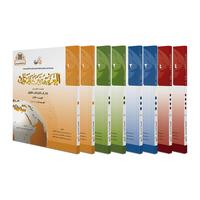٢٫١٥٫١٨٣ - التلوث - دفن النفايات
загрязнение||отходы
|دفن|زبالهها
die Verschmutzung|Vergrabung|
kirlilik|gömme|atıklar
Pollution|Landfill|Waste disposal
2,15,183 – Umweltverschmutzung – Verlagerung von Abfällen
2,15,183 - Pollution - Burial of waste
2.15.183 - Contaminación - vertido de residuos
2.15.183 - Pollution - mise en décharge des déchets
2,15,183 - Inquinamento - Seppellimento di rifiuti
2.15.183 - 오염 - 폐기물 매립
2.15.183 - Vervuiling - storten van afval
2.15.183 - Zanieczyszczenia - składowanie odpadów
2.15.183 - Poluição - Enterro de Resíduos
2,15,183 - Загрязнение - Захоронение отходов
2.15.183 - Föroreningar - deponering av avfall
2,15,183 - Kirlilik - Atıkların gömülmesi
2.15.183-污染-废物填埋
أحمد: أنا قادم من المستشفى.
||прихожу||
Ahmad|I|coming back from|from|the hospital
Ahmed: Ich komme aus dem Krankenhaus.
Ahmed: I am coming from the hospital.
Ahmed: Ik kom uit het ziekenhuis.
كنت أزور ابن صديقي صالحا؛ إنه مصاب بالسرطان.
||||den Guten||erkrankt|mit Krebs
I was|I visit|the son of|my friend|Salih|he is|afflicted with|with cancer
||||Salih|||kanserle
Ich habe den Sohn meines Freundes Saleh besucht; er leidet an Krebs.
I was visiting my friend Saleh's son; He has cancer.
Je rendais visite au fils de mon ami Salih ; Il a un cancer.
Ik was op bezoek bij de zoon van mijn vriend Salih. Hij heeft kanker.
عبد الله: وكيف حاله الآن؟
|||ihm|
servant|God|and how|his condition|now
|||durumu|
Abdullah: Wie geht es ihm jetzt?
Abdullah: How is he now?
أحمد: انتشر المرض في جسمه.
|verbreitete sich|||
Ahmad|spread|the disease|in|body
|yayılmak|||
Ahmad: Die Krankheit hat sich in seinem Körper ausgebreitet.
Ahmed: The disease spread throughout his body.
عبد الله: لا حول ولا قوة إلا بالله.
|||power||||by God
Abdullah: Es gibt keine Kraft und keine Macht außer bei Allah.
Abdullah: There is neither might nor strength except with God.
Abdullah : Il n'y a de puissance ni de force qu'en Dieu.
أحمد: كثرت أمراض السرطان في بلدنا، وهذا الأمر يحيرني كثيرا.
|haben zugenommen||Krebs||unser Land|||verwirrt|
Ahmad|increased|diseases|cancer diseases|in|our country|this matter|this matter|puzzles me greatly|a lot
|arttı|||||||şaşırtıyor|
Ahmed: Krebserkrankungen haben in unserem Land zugenommen, und diese Angelegenheit verwirrt mich sehr.
Ahmed: Cancer diseases have increased in our country, and this matter confuses me a lot.
Ahmed : Les maladies cancéreuses ont augmenté dans notre pays et cela me laisse beaucoup perplexe.
Ahmed: Kankerziekten zijn in ons land toegenomen, en dit verbaast mij enorm.
Ahmed: Ülkemizde kanser hastalıkları arttı ve bu konu benim çok kafamı karıştırıyor.
عبد الله: صدقت، فقد مات في مدينتنا وحدها عدد كبير خلال شهر واحد.
||||gestorben||||||||
|||for|died||||||in one||
||||öldü||||||||
Abdullah: Du hast recht, in unserer Stadt sind allein in einem Monat viele gestorben.
Abdullah: You are right, a large number of people died in our city in one month.
Abdullah : Vous avez raison, un grand nombre de personnes sont mortes dans notre ville, dont une en un mois.
Abdullah: Je hebt gelijk: een groot aantal mensen stierf in onze stad en één van hen binnen een maand.
Abdullah: Haklısın, şehrimizde bir ayda çok sayıda insan öldü.
أحمد: ذكرت الصحف، أن هناك نفايات مدفونة في بلادنا.
|hatte erwähnt||dass||Abfälle|vergraben||
Ahmad|mentioned|the newspapers|that|there|buried waste|buried|in|our country
|söyledi|||||gömülü||
Ahmed: Die Zeitungen berichteten, dass es Abfälle gibt, die in unserem Land vergraben sind.
Ahmed: The newspapers mentioned that there is buried waste in our country.
Ahmed : Les journaux ont rapporté qu'il y avait des déchets enfouis dans notre pays.
Ahmed: De kranten berichtten dat er in ons land begraven afval ligt.
Ahmed: Gazeteler ülkemizde gömülü atık olduğundan bahsetmiş.
عبد الله: من أين جاءت تلك النفايات؟
||from||came from|those|the trash
Abdullah: Woher kommen diese Abfälle?
Abdullah: Where did that waste come from?
Abdullah: Waar kwam dat afval vandaan?
أحمد: أحضرت من بعض الدول الصناعية؛ لتدفن في بلادنا.
|ich habe gebracht|||Länder|industriellen|zu begraben||
Ahmad|"I brought"|from|some|countries|industrialized countries|to be buried|in|our country
||||||gömülmek||
||||||pour enterrer||
Ahmad: Sie wurden aus einigen Industrieländern gebracht, um in unserem Land begraben zu werden.
Ahmed: I was brought from some industrialized countries. to be buried in our country.
Ahmed: Het kwam uit een aantal geïndustrialiseerde landen. Om begraven te worden in ons land.
عبدالله: ولماذا لا تدفن في تلك البلاد الصناعية؟!
|||beerdigen||||
Abdullah|and why|not|bury|in|that|the countries|industrialized countries
|||gömülür||||sanayi
Abdullah: Warum werden sie nicht in diesen Industrieländern begraben?!
Abdullah: Why not be buried in those industrial countries?!
Abdullah: Niye o sanayileşmiş ülkelerde gömülmüyor?!
أليس لهم أرض مثلنا؟!
||Land|
Isn't|them|land|like ours
||toprak|
Haben sie nicht auch ein Land wie unseres?!
Do they not have a land like us?!
Bizim gibi memleketleri yok mu?!
أحمد: بلى، لهم أرض مثلنا، ولكن لديهم منظمات لا تسمح بتلوث البيئة، وهم يخافون على شعوبهم.
|doch||||||Organisationen||erlauben|Verschmutzung der Umwelt||sie|sie haben Angst||ihre Völker
Ahmed|Yes, they do|they have|land|like ours|but|they have|organizations|that|"do not allow"|polluting the environment|the environment|they|are concerned about|for|their peoples
|||toprak||||||izin veriyor||||korkarlar||
Ahmed: Ja, sie haben ein Land wie unseres, aber sie haben Organisationen, die Umweltverschmutzung nicht zulassen, und sie fürchten um ihre Völker.
Ahmed: Yes, they have a land like ours, but they have organizations that do not hear about environmental pollution, and they fear for their people.
Ahmed: Ja, ze hebben land zoals wij, maar ze hebben organisaties die milieuvervuiling niet toestaan, en ze vrezen voor hun mensen.
عبدالله: ولماذا لا نخاف على شعوبنا مثلهم، وتكون لنا منظمات مثل منظماتهم؟!
|und warum|nicht|haben||unsere Völker|wie sie|es gibt||||ihren Organisationen
Abdullah|and why|not|worry about|for|our peoples|like they do|"and have"|"for us"|organizations|like|their organizations
|||||halklarımız||||||
Abdullah: Warum fürchten wir uns nicht genauso um unsere Völker und haben Organisationen wie ihre Organisationen?!
Abdullah: Why don't we fear for our people like them, and have organizations like theirs?!
Abdullah: Waarom zijn we niet bang voor onze mensen zoals zij, en hebben we geen organisaties zoals die van hen?!
Abdullah: Neden onlar gibi insanlarımızdan korkmuyoruz ve onlarınki gibi örgütlere sahip değiliz?!
أحمد: هذا ما يجب عمله.
|das|||
Ahmad|this|what|must be|do about it
Ahmed: Das ist das, was getan werden muss.
Ahmed: This is what should be done.
Ahmed : C'est ce qu'il faut faire.
Ahmed: Dit is wat er moet gebeuren.
Ahmed: Yapılması gereken bu.

